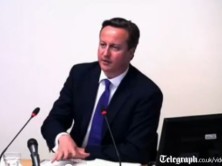TechCrunch's founder Michael Arrington announced he is investing again. (Credit: TechCrunch, screenshot)
The founder of TechCrunch, founder and editor Michael Arrington, has decided to start investing in start-ups and at least two venture funds, including some he may cover. The announcement is a reversal of his 2009 statement that he would no longer invest because TechCrunch was being accused of conflicts of interest.
That decision has triggered an “ethics outrage,” as Internet Evolution puts it, because AOL, which bought TechCrunch last fall, is seemingly making an exception to its policies for Arrington to invest.
While AOL Huffington Post Media Group stated to Business Insider that its employees can’t “have a financial interest in a company or industry that they regularly cover,” Arrington is the exception to that rule because his “involvement with Silicon Valley” helps make TechCrunch “a must-read site.” According to AOL, Arrington’s investing helps him report, and TechCrunch “is committed to transparency.” (See AOL’s full statement here.)
Likewise, Arianna Huffington reportedly commented that Arrington will disclose any relationships to the companies he covers.
Meanwhile, InfoWorld, “a direct competitor to TechCrunch,” questioned how Arrington will disclose non-coverage of “bad news about one of his key investments.”
The Back Story
Arrington announced April 27 that, after a two-year hiatus, he has started to invest in companies again.
According to Arrington, he stopped “investing in startups completely” because TechCrunch kept getting accused of having conflicts of interest. If other journalists criticize Arrington for going back into investing, he commented that it’s just because they’re competitors of TechCrunch.
As he wrote: “Other tech press will make hay out of this because they don’t like the fact that we are, simply, a lot better than them.”
In Arrington’s 2009 post declaring he stop investing, he stated:
“Conflicts of interest and ethical reporting are something that we are very careful about at TechCrunch. We write principally about new startups, and these companies are usually very nervous about early reviews of their products. We’ve been offered significant cash payments to write about some companies, which have always been rudely declined. We’ve always been extremely careful to disclose any conflicts of interest in our stories (which is usually that I’ve invested in a competitor). These conflicts are very rare.”
Arrington had noted that “transparency is key” and that even though TechCrunch reportedly disclosed all investments, his investing was “a weak point that competitors and disgruntled entrepreneurs use to attack our credibility.”
But that has changed. Arrington revealed in his disclosure announcement this week that as of “several months” ago, he’s decided to change that and invest again. Instead of pretending that there will be no conflicts of interest, Arrington admitted there would be and said he would just disclose any investments.
“Some people have seen this as a conflict of interest, which it of course is. To counter that I’ve always disclosed investments, and try not to cover these startups myself. Occasionally when news is breaking quickly or for other reasons, I will write about the company, but with the appropriate disclosure.”
To resolve the reality that “there will be financial conflicts of interests in a lot of my stories,” Arrington said he’ll just disclose his investments and “this will all be fine.”
For example, Arrington noted that he is a “limited partner in two venture funds, Benchmark Capital and SoftTech VC” and has invested in “Shawn Fanning’s new startup and in Kevin Rose’s new startup.” TechCrunch reported on Fanning’s startup and disclosed that Arrington is the only confirmed investor.
Arrington went on to comment that “There’s a period of time with any investment when I know an investment is possible or likely but it can’t be announced yet.” In that case and time, he said he won’t cover the startup.
“When another writer wants to break a story we may have to hold that story, or it becomes a forcing function in announcing sooner.” According to Arrington, TechCrunch’s report on the Shawn Fanning start-up is an example of when things were a bit crunched because a TechCrunch reporter “had the story independently and wanted to run with it,” but Arrington would have to disclose his financial interest.
As Arrington explained, “I can’t reasonably ask him to hold the story (THAT would be a conflict of interest in itself), but he can’t publish it here without the disclosure that I’m investing. Which led to the interesting situation where I was the only investor who confirmed on the record.”
In the comments section, reader Ben Metcalfe questioned if TechCrunch would disclose similarly for other staff. Arrington responded that guest writers are advised on the disclosure policy and that other staffers don’t invest.
AOL bought TechCrunch last fall and Huffington Post in February.
Kara Swisher at All Things D reported that she asked Arianna Huffington for comment about Arrington’s investments and she responded:
“TechCrunch is committed to transparency. Michael has written about the guidelines he follows–that he rarely writes about companies in which he is an investor, and that, when he does, he clearly discloses this information. The same rules apply when TechCrunch’s writers cover these companies.”
Forbes’ Jeff Bercovici, who disclosed that he worked for AOL for 16 months before moving to Forbes last fall, commented that Arrington “makes a mockery” of the AOL Huffington Post ethics policy. Noting that Arrington “voluntarily” stopped investing to avoid conflicts of interest, Bercovici commented:
“As for the idea that being involved in the tech scene as an investor makes him a better informed observer, one might as well say that an energy reporter who consults for Halliburton and BP is better serving his readers through the insights he acquires moonlighting. It makes exactly as much sense.”
Business Insider reported in a follow-up Q & A with Arrington (see here). He denied that he was “trying to get fired from AOL” by changing tack on his investment policy. “I like my job and I’m extremely well-paid, and AOL hasn’t messed with us at all, at least on the editorial side.”
He also argued that “friendship conflicts are the real issue,” when reporters have relationships with people they work about, whether it be marriage or friendship or whatnot.
CNET commented that “it’s best to have a blanket policy of no investments allowed. That way readers can read the news without having to do all the leg work to figure out if there is any bias.”
CNET also questioned why Arrington changed his mind on investing after two years.
iMediaEthics has written to Arrington to ask why he changed his policy, what prompted his disclosure now if he has been investing for “several months,” and if AOL/Huffington Post approved his decision to invest again or if he made the decision independent of AOL/Huffington Post. We will update with any response.






